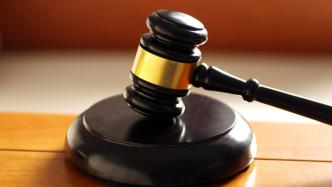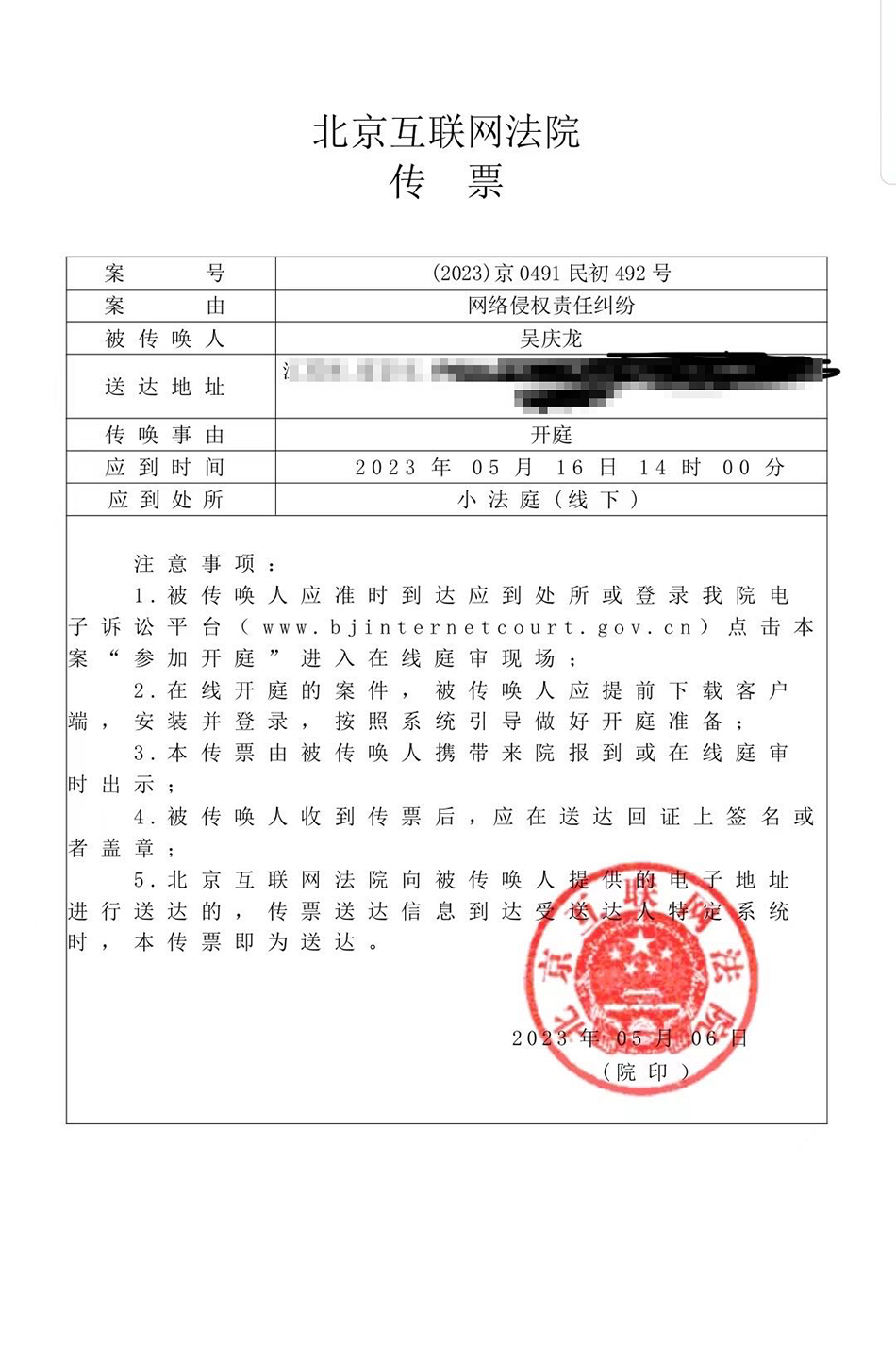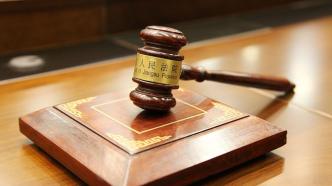

On the afternoon of May 15, the relevant staff of the Beijing Internet Court told Peng Mei Technology that the space of the "small court" is not large, and there are only 3 auditorium seats.
Chen Fahu, academician of the Chinese Academy of Sciences, chairman of the Chinese Geographical Society, and director of the Qinghai-Tibet Plateau Institute of the Chinese Academy of Sciences, sued Wu Qinglong, a former postdoctoral fellow of the School of Archeology and Museology of Peking University. (offline)" in court.
On May 15, The Paper confirmed the above news from the Beijing Internet Court.
On the afternoon of the 15th, a relevant staff member of the Beijing Internet Court stated that the "small court" where the trial is held is indeed not large, with only three auditorium seats. "The plaintiff has already applied for two or three (auditor seats)... At present, there are no remaining auditorium seats." Whether to broadcast the trial of the above-mentioned cases online needs to be decided by the presiding judge, which has not yet been determined.
On the afternoon of the 15th, Wu Qinglong said that he had previously learned from the staff of the Beijing Internet Court that the trial court had only three auditorium seats. He believes that there are too few auditorium seats to meet the auditing needs of personnel from relevant departments or institutions. He applied to the Beijing Internet Court to live broadcast the trial of the above case according to law.
According to previous reports by The Paper, Wu Qinglong published an article on the Internet, questioning a landmark achievement paper published by Academician Chen Fahu in Science, "the conclusion is wrong and suspected of manipulating evidence for falsification." Chen Fahu sued that the defendant, without any evidence to prove that the plaintiff was suspected of academic misconduct, continued to maliciously slander and insult the plaintiff, which seriously disrupted the order of academic discussions and had a serious adverse effect on the normal work of the plaintiff. He demanded compensation and made a public apology.
The papers involved were published online on November 20, 2014. One year later, on December 7, 2015, Chen Fahu was elected as an academician of the Chinese Academy of Sciences.
The title of the paper involved is "Agriculture facilitated permanent human occupation of the Tibetan Plateau after 3600 BP" (Agriculture facilitated permanent human occupation of the Tibetan Plateau after 3600 BP). On November 30, 2014, China's government website quoted Xinhua News Agency's "Chinese Scientists Reveal Reasons for Human Settlement on the Qinghai-Tibet Plateau" as reporting that "a research team led by Chen Fahu, Dong Guanghui, Zhang Dongju, etc. has studied 200 areas in the northeast of the Qinghai-Tibet Plateau since 2008. According to the newly obtained data, combined with published research results in related fields, the research team found that the activities of prehistoric humans on the Qinghai-Tibet Plateau ranged from short-term seasonal hunting to large-scale permanent settlement. A long process of adaptation. The large-scale dispersal of ancient humans to the Qinghai-Tibet Plateau occurred after 3600 years ago."
On August 5, 2016, Wu Qinglong, as the corresponding author, published a research paper in the journal "Science", titled "The Outbreak Flood in 1920 BC Supports the Great Flood and the Existence of the Xia Dynasty in Chinese Legends" ( Outburst flood at 1920 BCE supports history of China's Great Flood and the Xia dynasty). Its first signature unit is the School of Archeology and Museology of Peking University.
Wu Qinglong said that he was subsequently "blocked" because he refused to add relevant units to the signature units of the above-mentioned papers.
Chen Fahu has successively served as the dean of the School of Resources and Environment of Lanzhou University, the vice president of Lanzhou University, and the director of the Qinghai-Tibet Plateau Research Institute of the Chinese Academy of Sciences.
When Wu Qinglong was in the first and second year of his master's degree, Chen Fahu served as his tutor. In the third year of master's degree, Wu Qinglong was transferred to other tutors until graduation.
An online article published by Wu Qinglong’s real name stated, “You (reporter’s note: Chen Fahu) once claimed to Xinhua News Agency and other media that you selected 53 ruins with complete strata for research (http://www.gov.cn/xinwen/2014 -11/30/content_2784867.htm )...But you did not publish any archaeological stratigraphic evidence of any site in the main body and supplementary part of your paper, which is a very strange phenomenon. At that time, a An archaeologist who is very familiar with the study area once said: "This study is very meaningful, and a lot of plant archaeological research and carbon 14 dating have been done, but unfortunately there is no stratigraphy."
The above-mentioned online article stated, “Since May 2021, in order to rule out the possibility of manipulating evidence and falsifying evidence in this paper, I have written several mass emails to Lanzhou University and the Ethics Committee of the Chinese Academy of Sciences, requesting and urging you to disclose the archaeological records of 53 sites in this paper. Stratigraphic evidence, I have repeatedly asked you and Dong Guanghui to release archaeological evidence, but you have always refused."
According to the official website of the Beijing Internet Court, Internet tort liability disputes refer to tort liability disputes arising from the infringement of other people’s personal rights, property rights and other civil rights and interests on the Internet (mostly in the form of infringement of natural persons’ portrait rights, reputation rights, privacy rights and other personality rights) .
On the afternoon of May 15, 2023, Zhu Bao, a lawyer from Beijing Dacheng (Harbin) Law Firm, told The Paper that compared with ordinary online infringement cases, this case has certain particularities. Considering this case in light of the existing legal system, we must take into account two inevitable ethics: the first is the ethics of mentoring and apprenticeship. This case happened between a former teacher and apprentice. Whether it is in terms of socialist values or traditional culture, it is a challenge, and it needs to be carefully considered and handled by the court. Is it an academic dispute between master and apprentice, or wanton slander? Should the judiciary intervene, and how deeply should it intervene? Of course, students are not allowed to slander the teacher, but when faced with such doubts, how should the teacher respond, should they just sue the students? Are other academic institutions or school organizations required to mediate? Both the plaintiff and the defendant have special and outstanding identities. One is an academician of the Chinese Academy of Sciences, and the other is a postdoctoral fellow at the School of Archeology and Museology of Peking University. I believe the court will be very cautious in the judgment process. In other words, is this incident an academic debate, or a dispute over Internet tort liability for wanton insults and slander? Need a court to give a clear decision. If it is an academic debate, then tolerance should be given. However, if it is a non-factual statement of wanton slander, it cannot chill the hearts of scientists, and the law should restrict it.
In addition, lawyer Zhu Bao told The Paper that the second ethical issue involved in this case is that although the scientific community has gradually formed gradually clear standards, it is not difficult to define whether it is suspected of plagiarism, plagiarism, manipulation of evidence, intentional fraud, etc. Misconduct, but are current standards retroactive? Do papers from ten years ago need to be examined by today's standards? This is for us to think about. In addition, it is a very common infringement case. Is there any infringement, is there any actual damage caused by the infringement, how much loss has been caused, and the perpetrator is not at fault for such damage? Courts are easy to judge and deal with.
